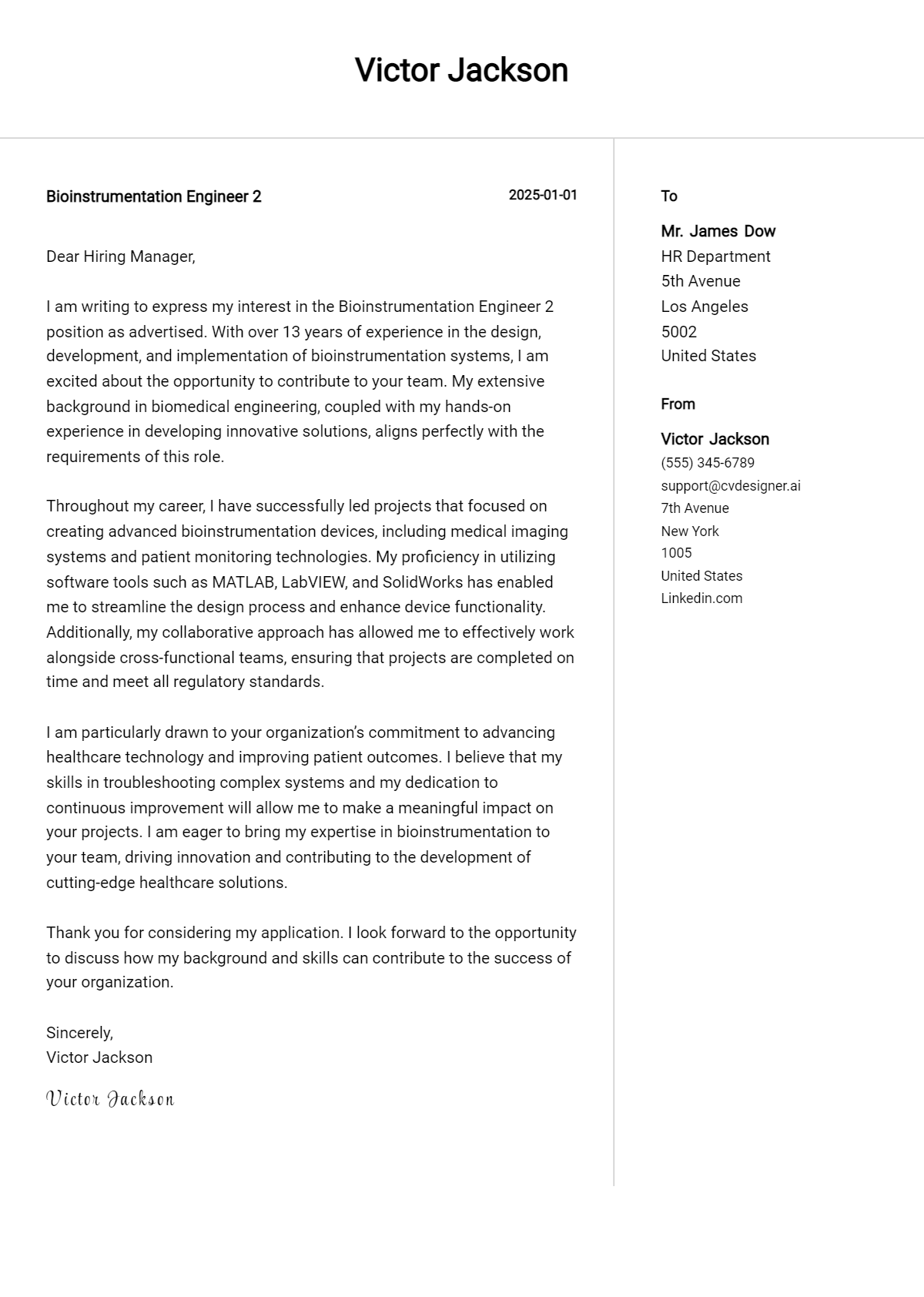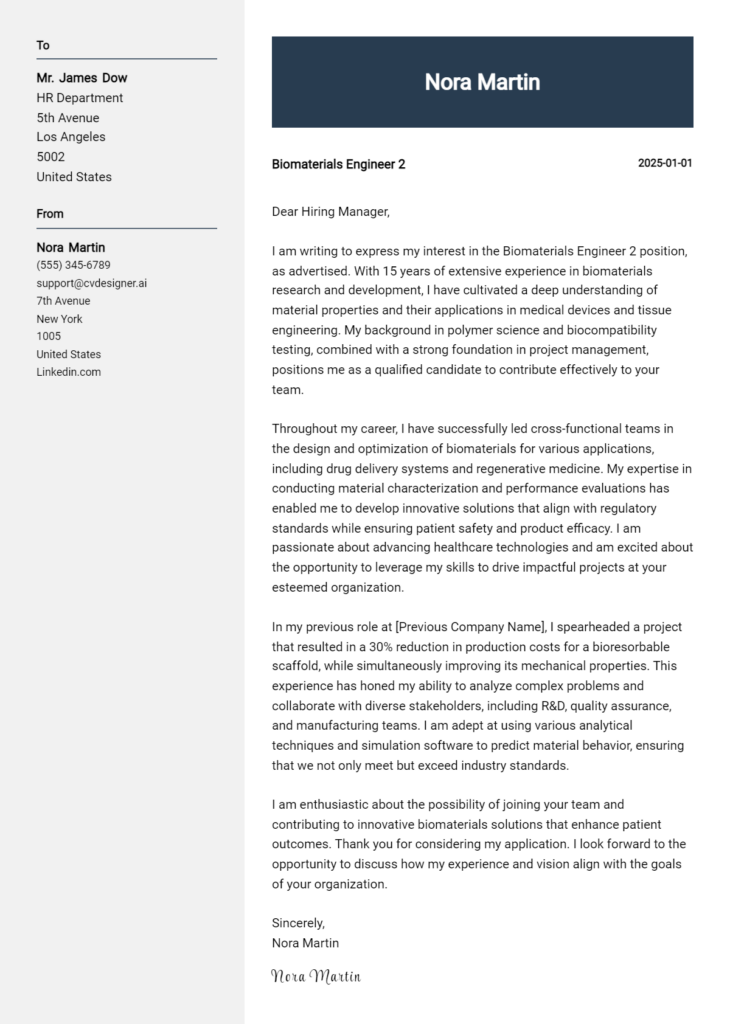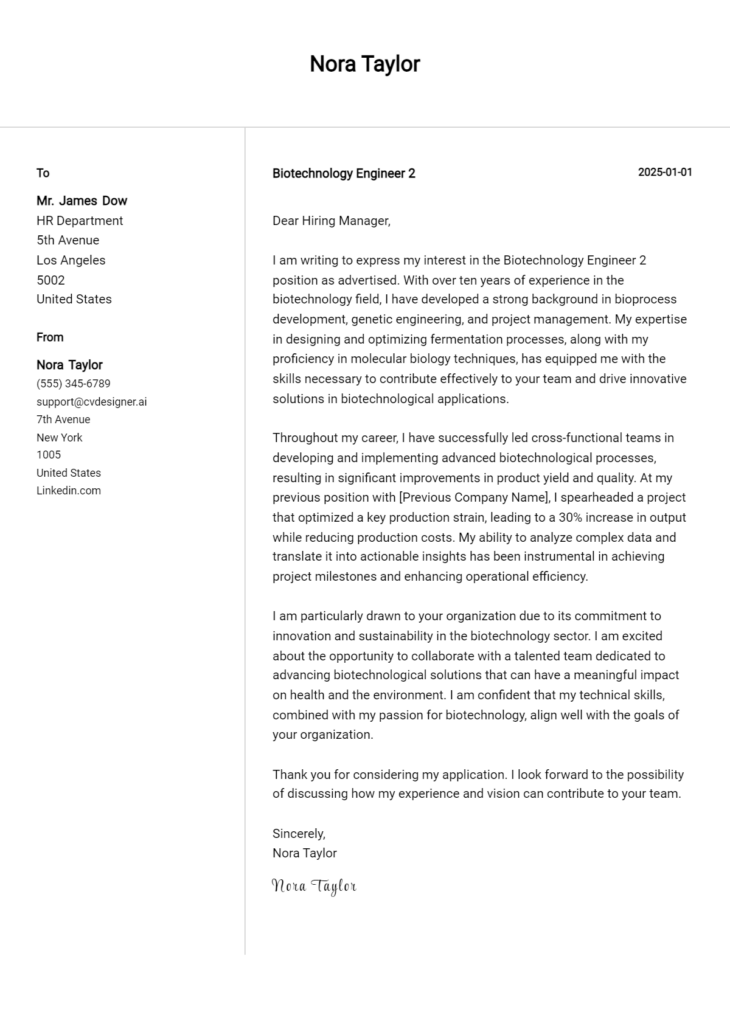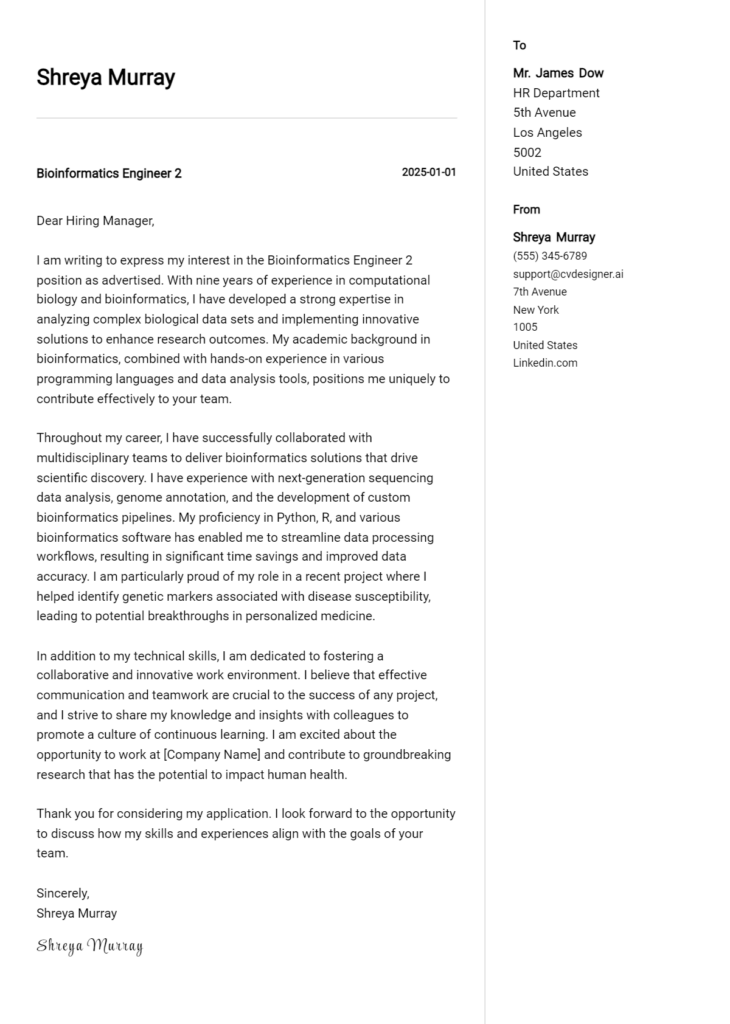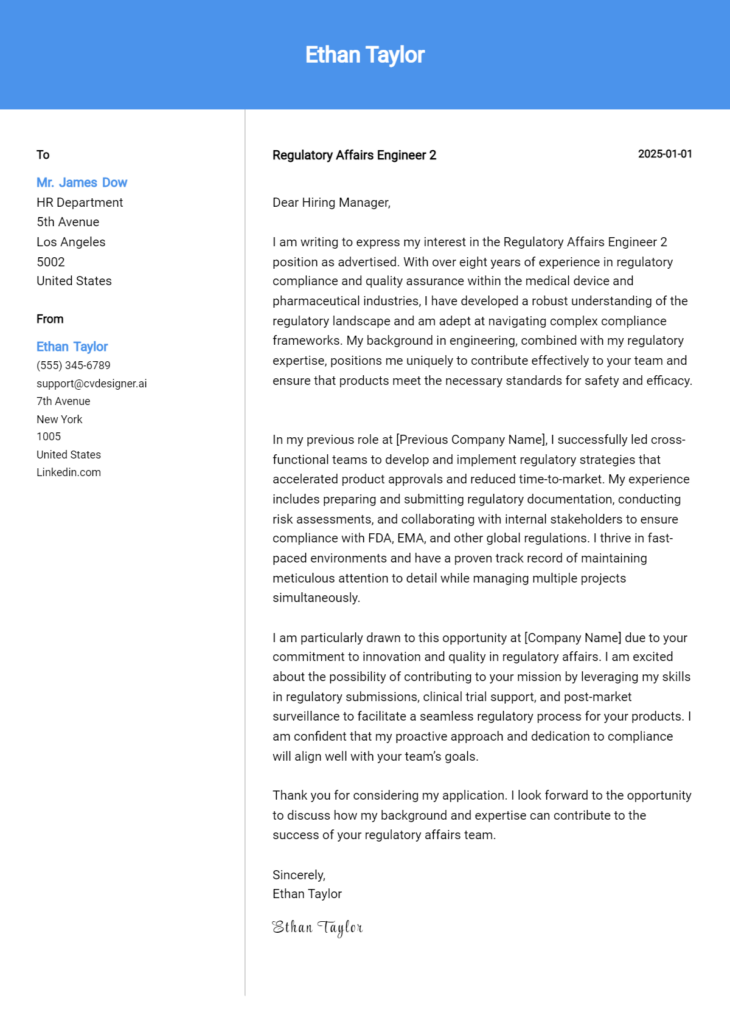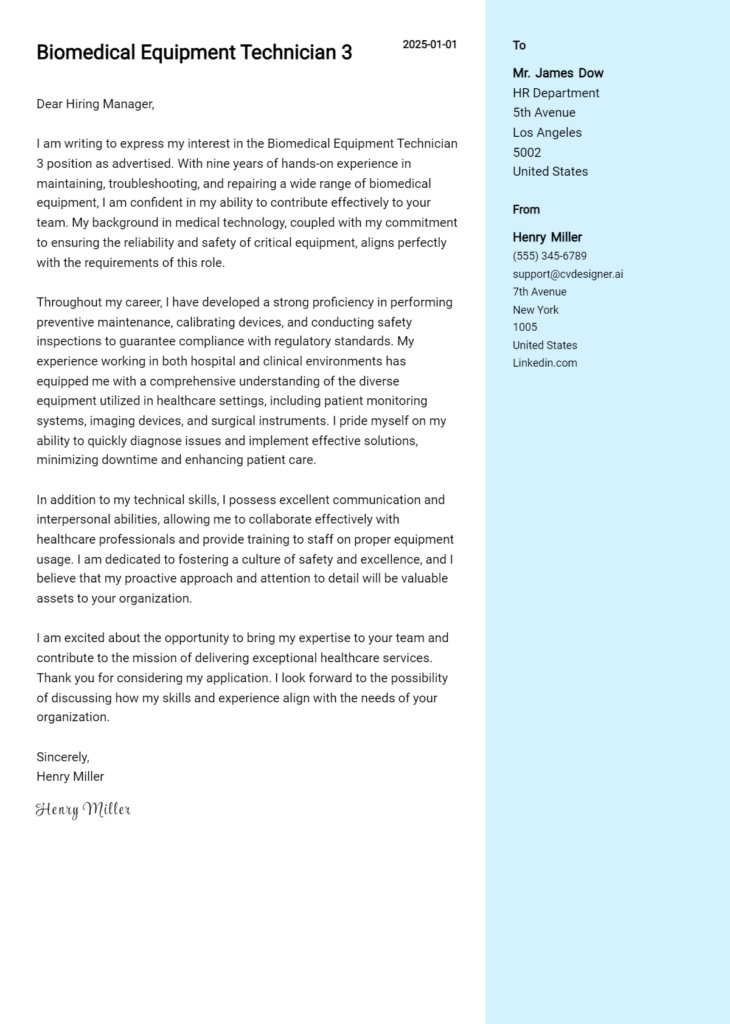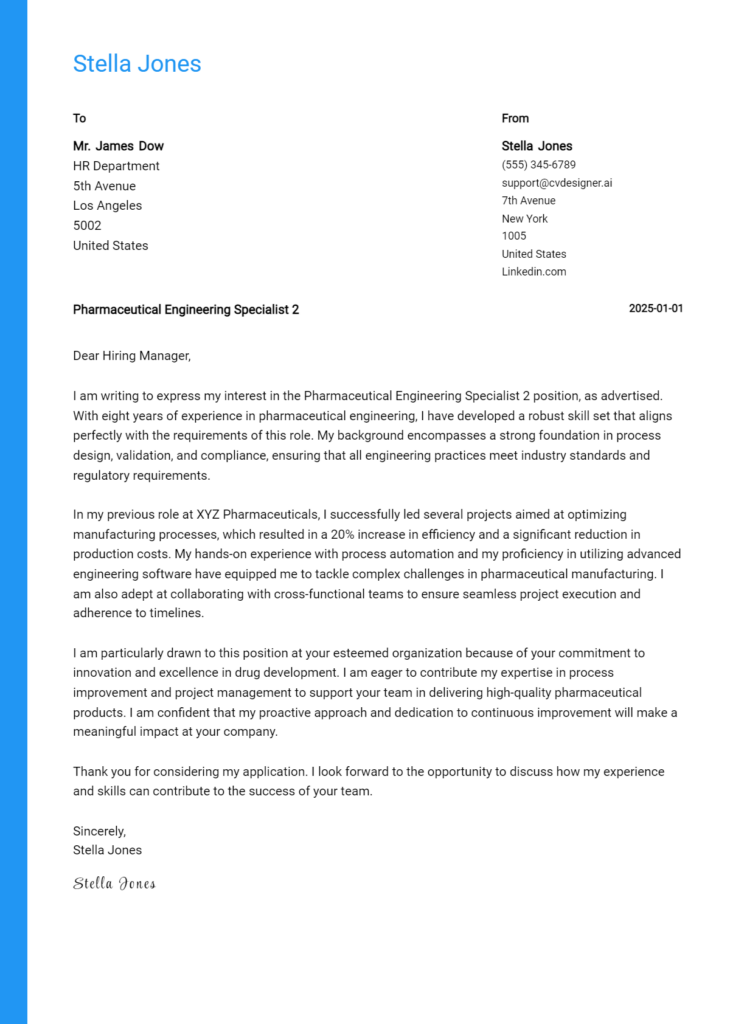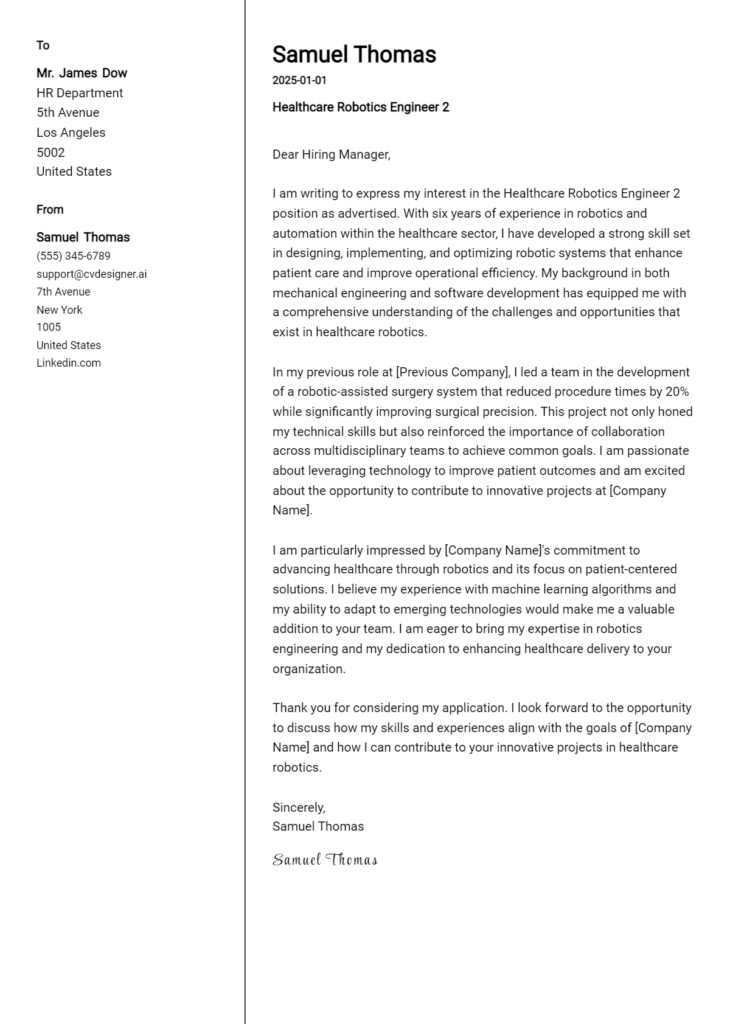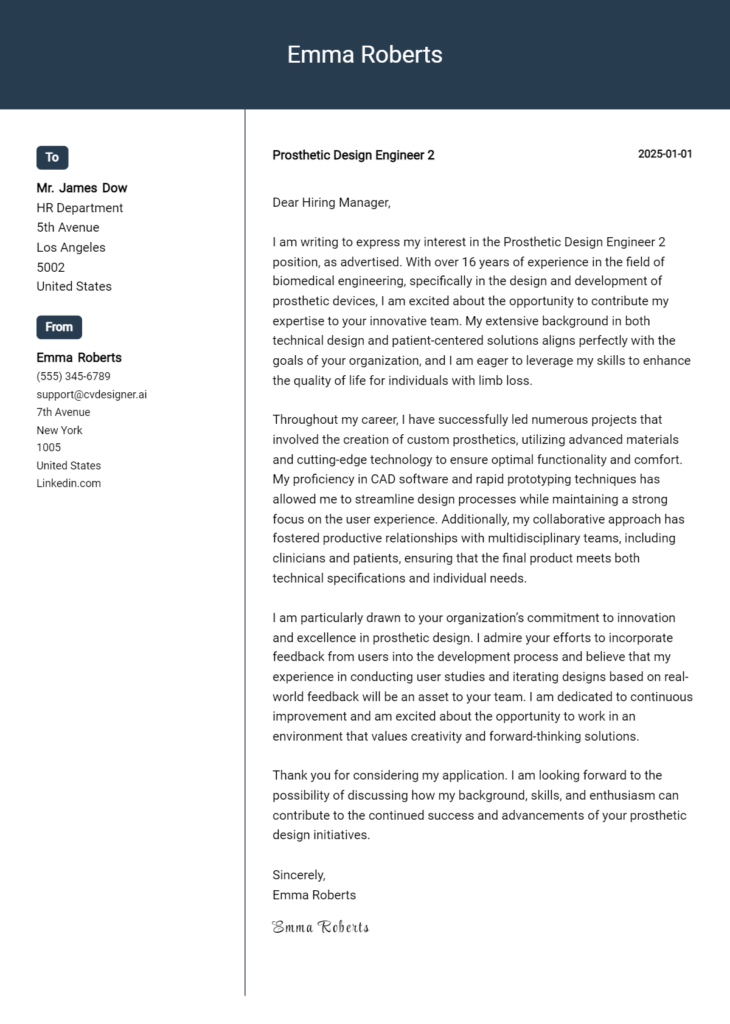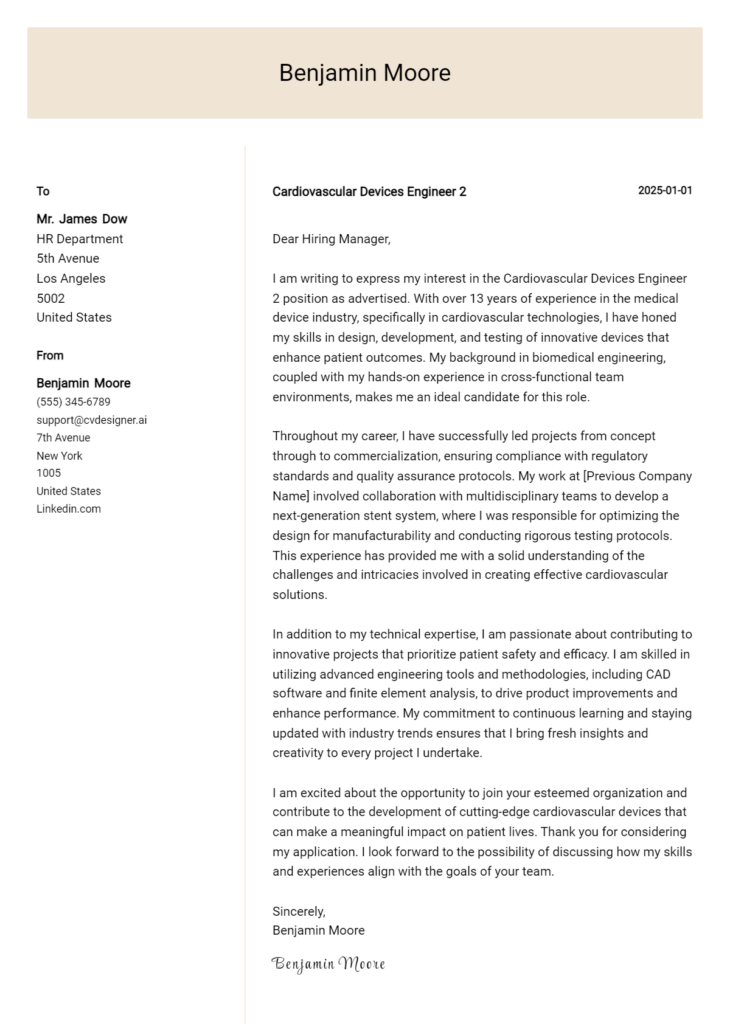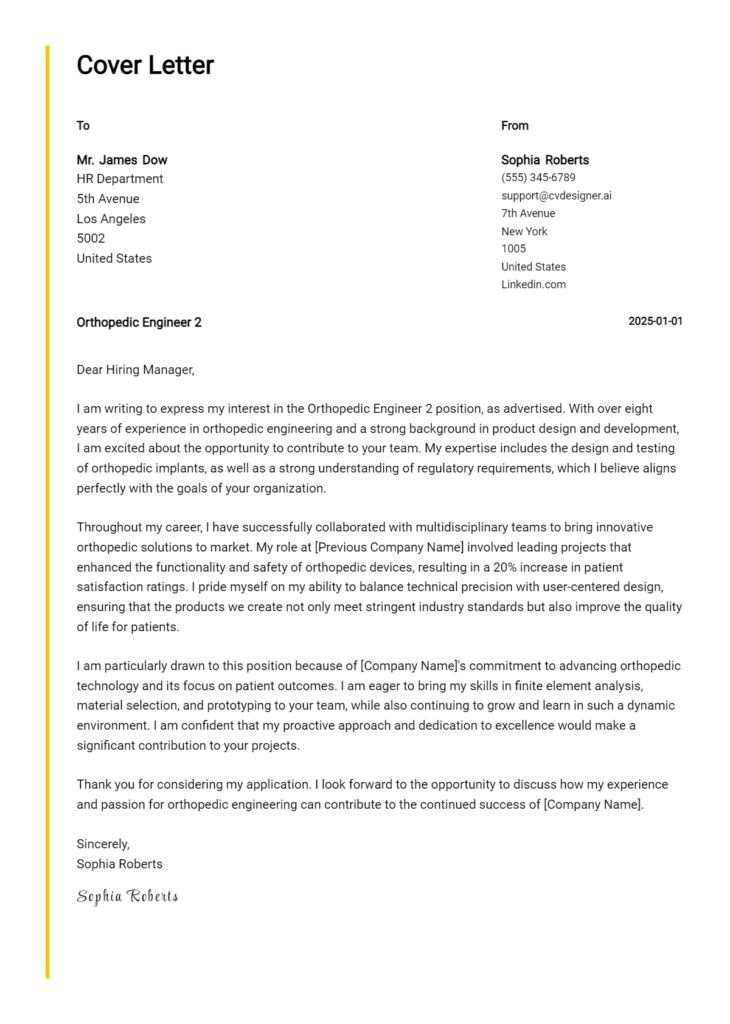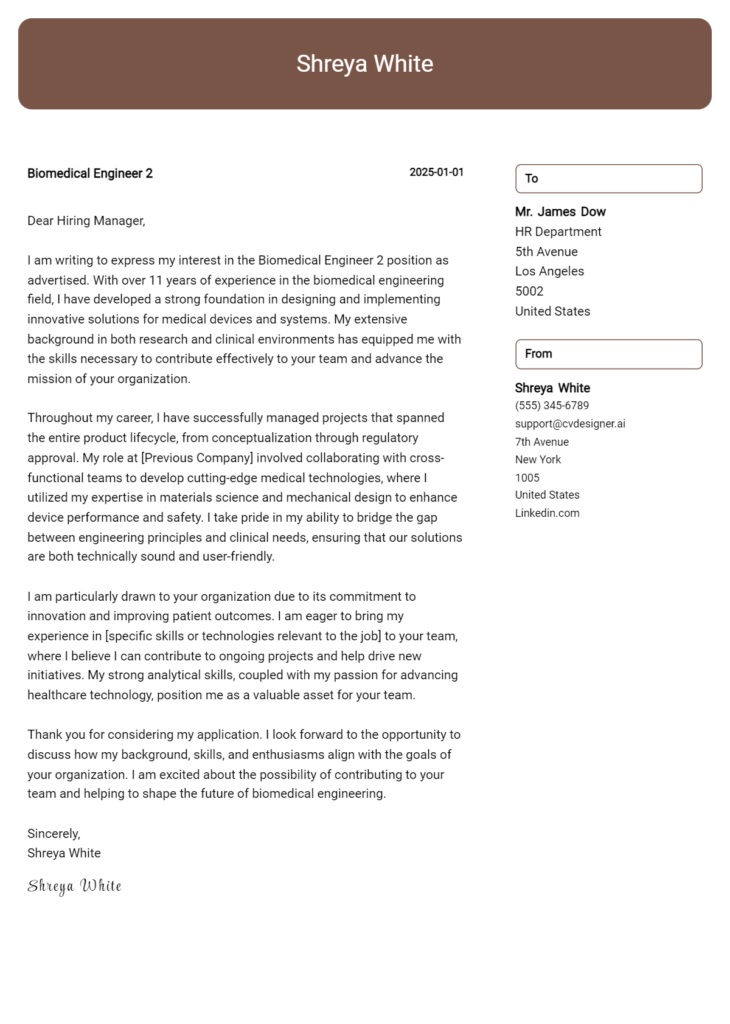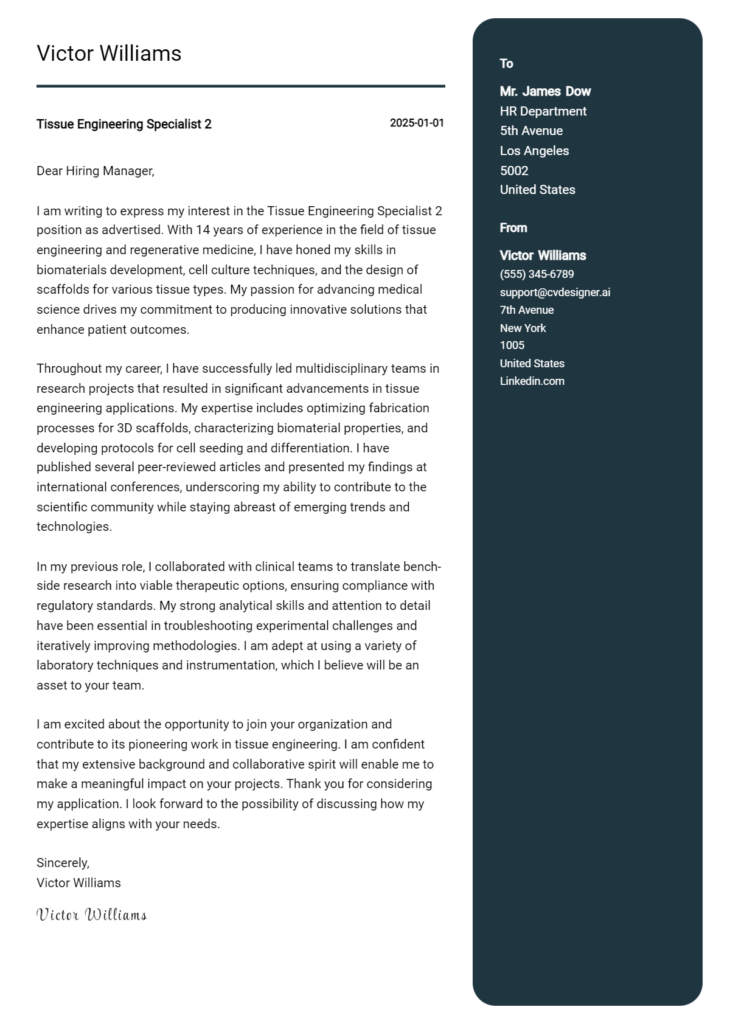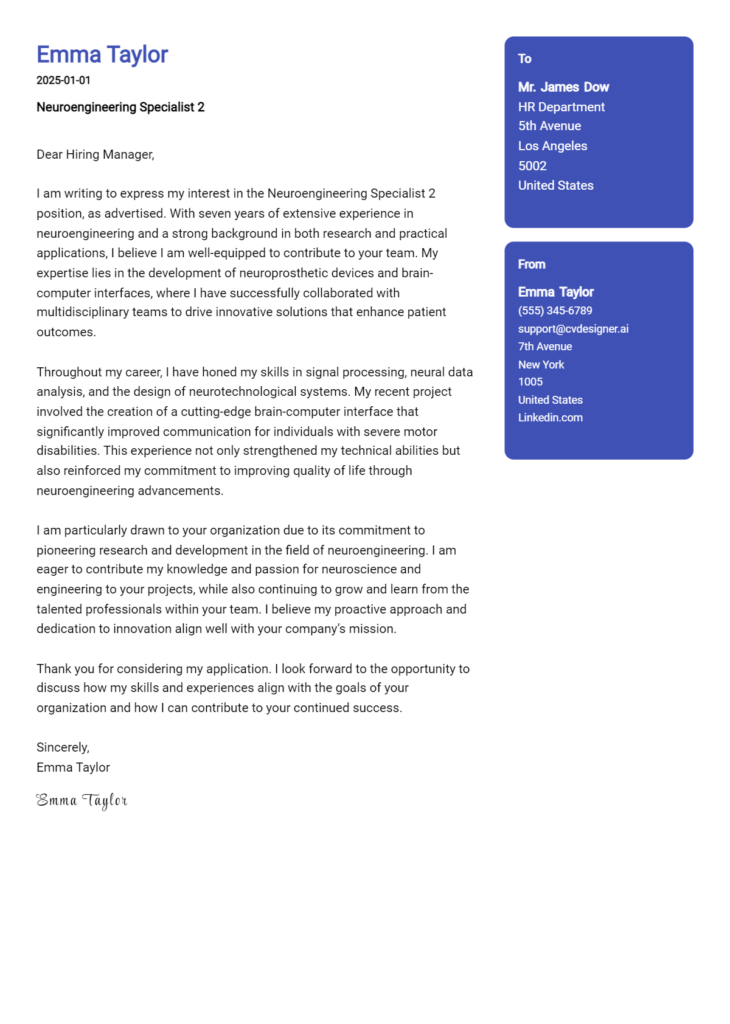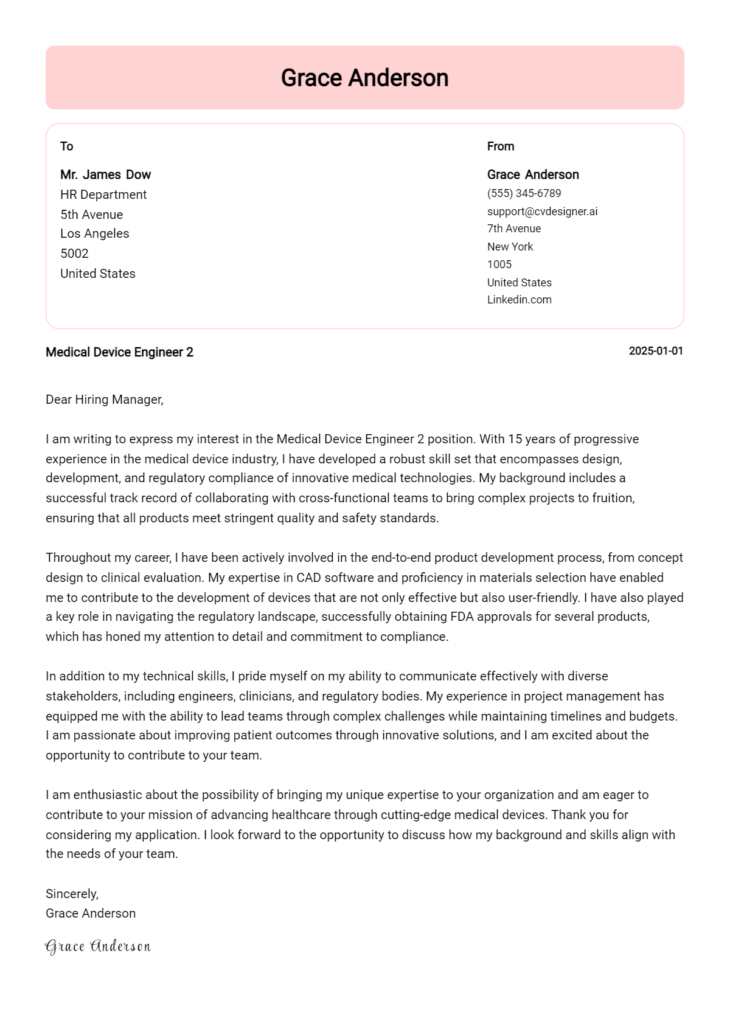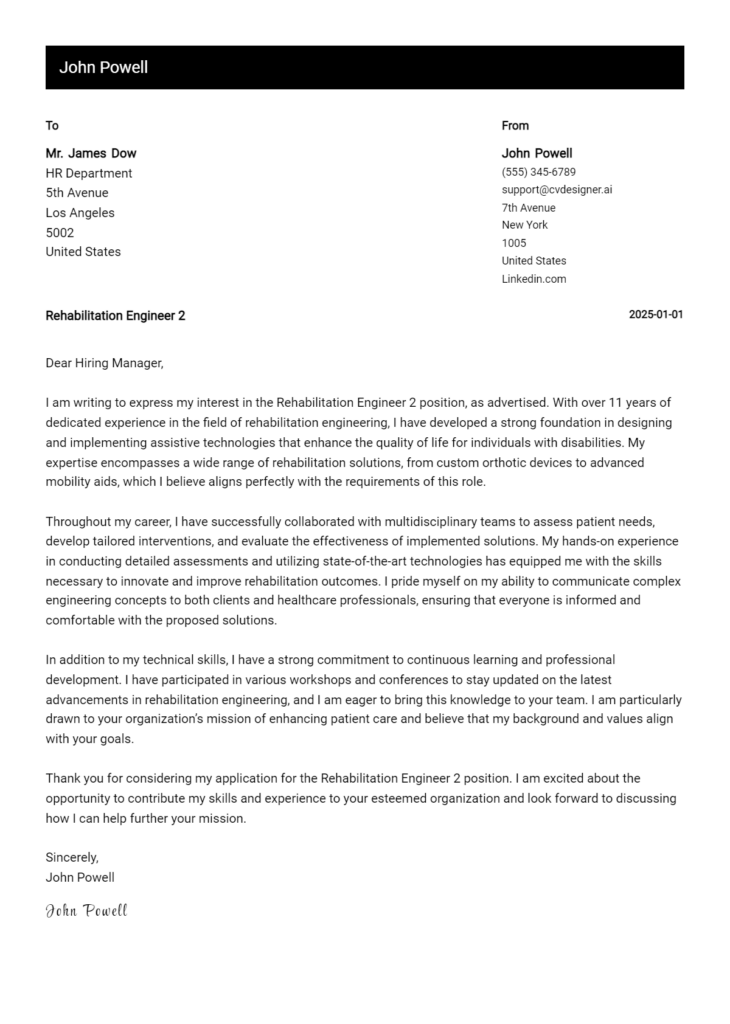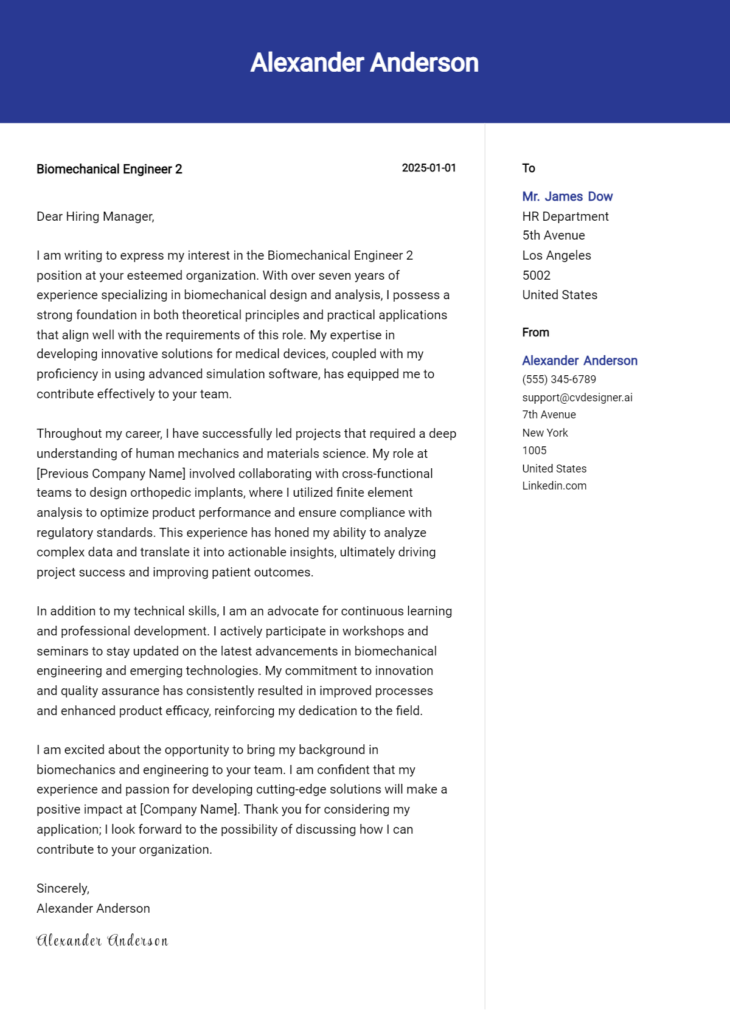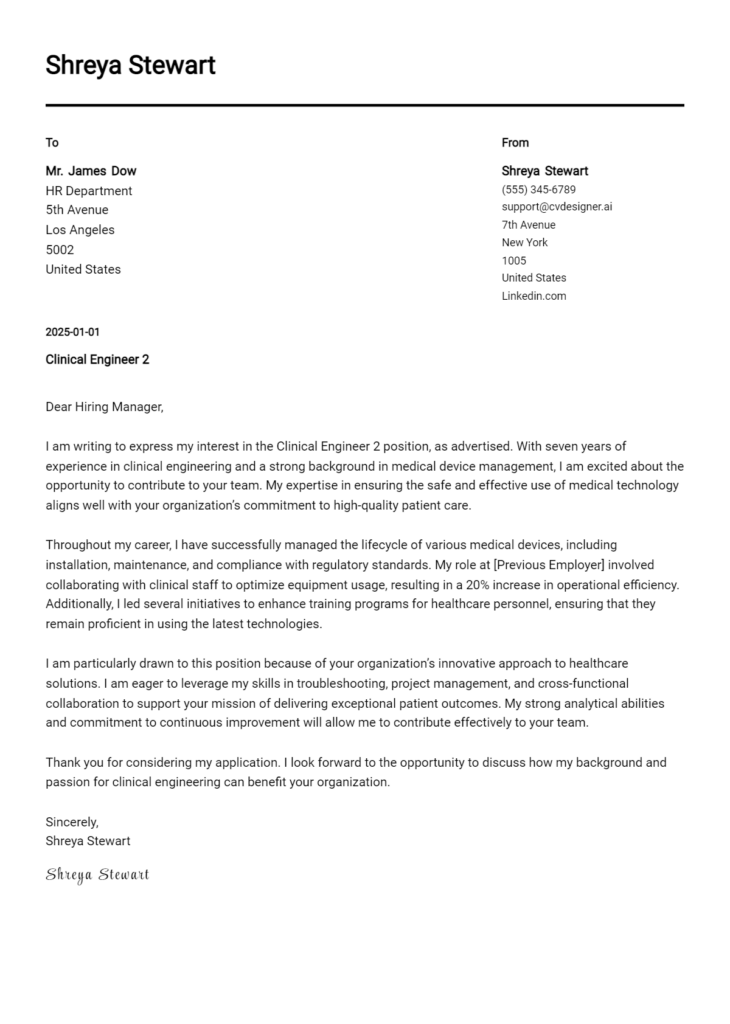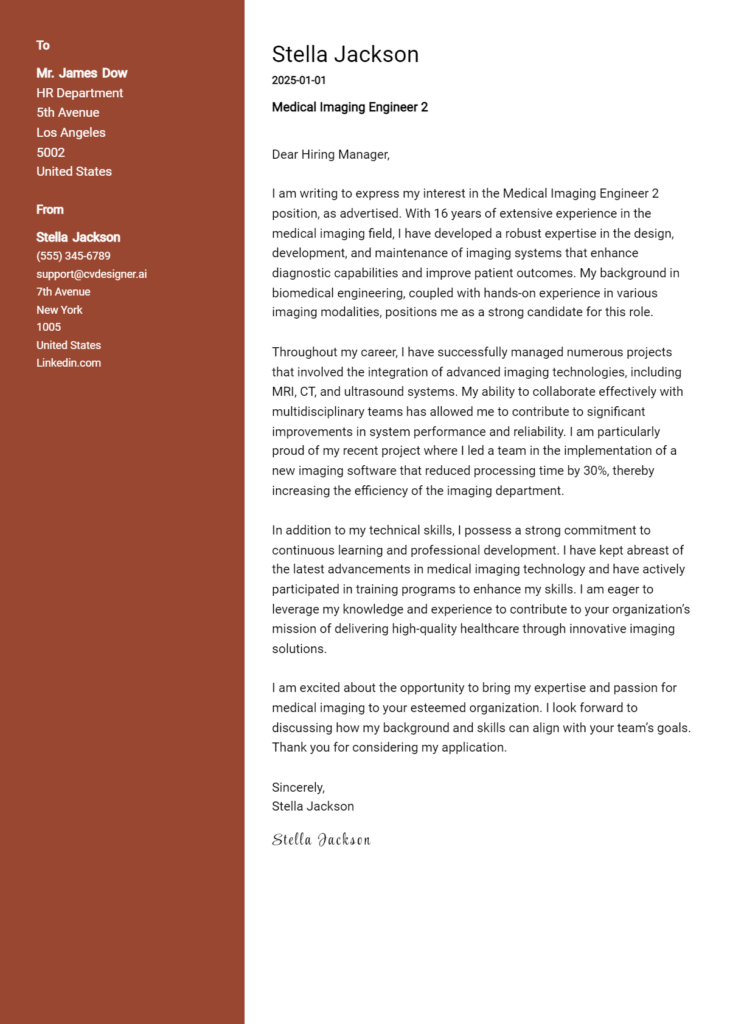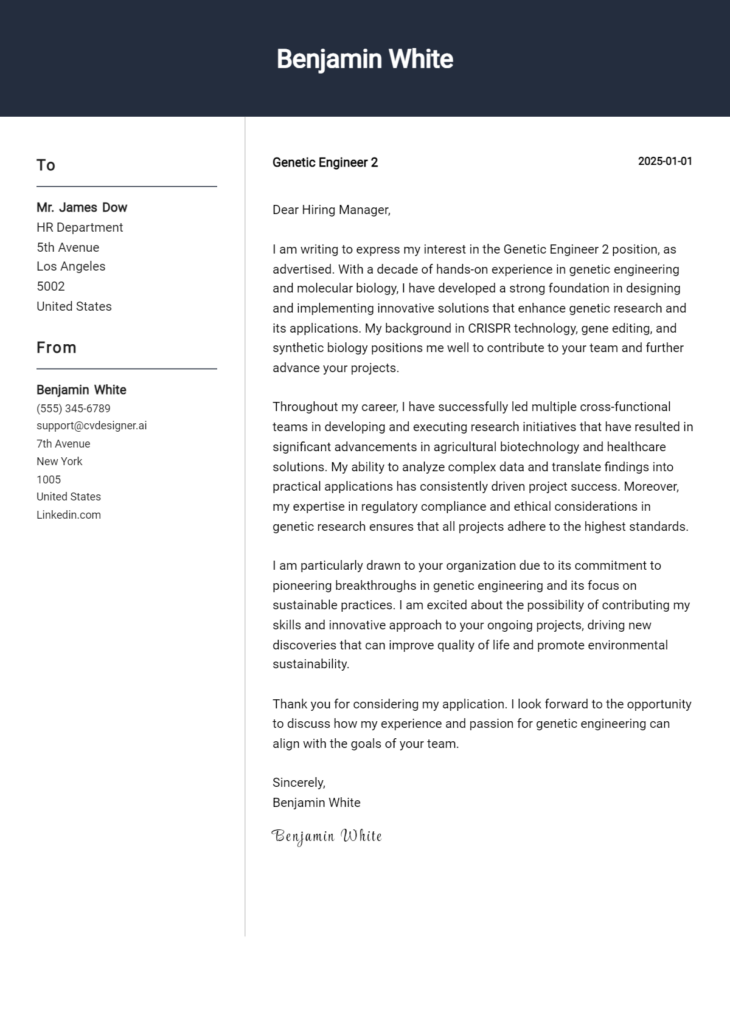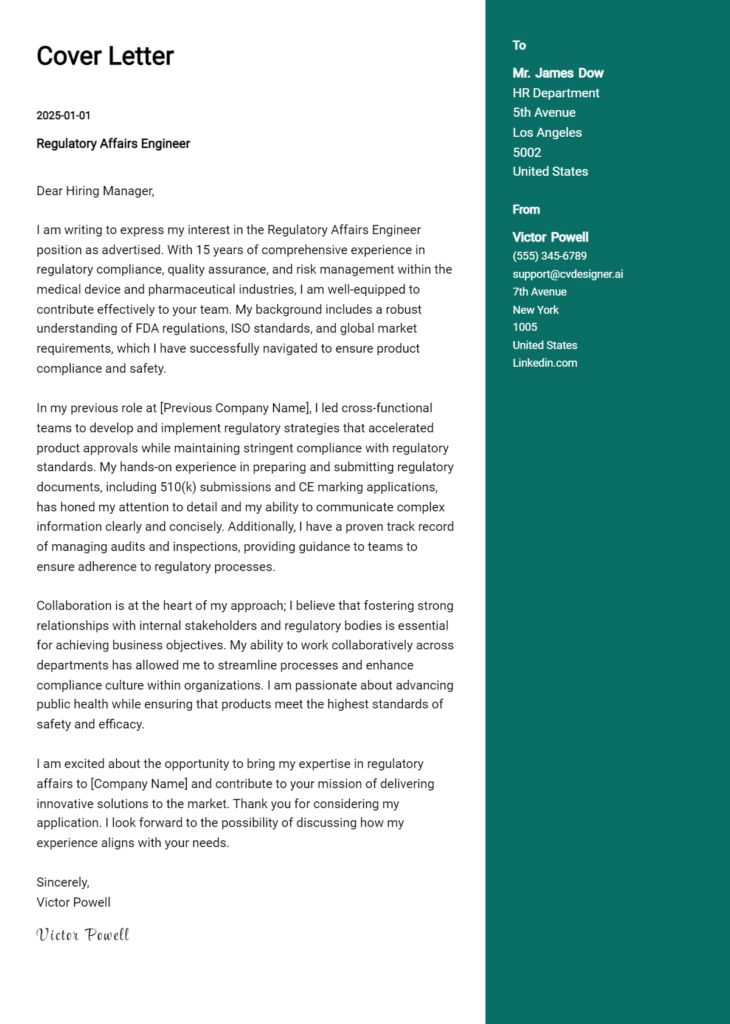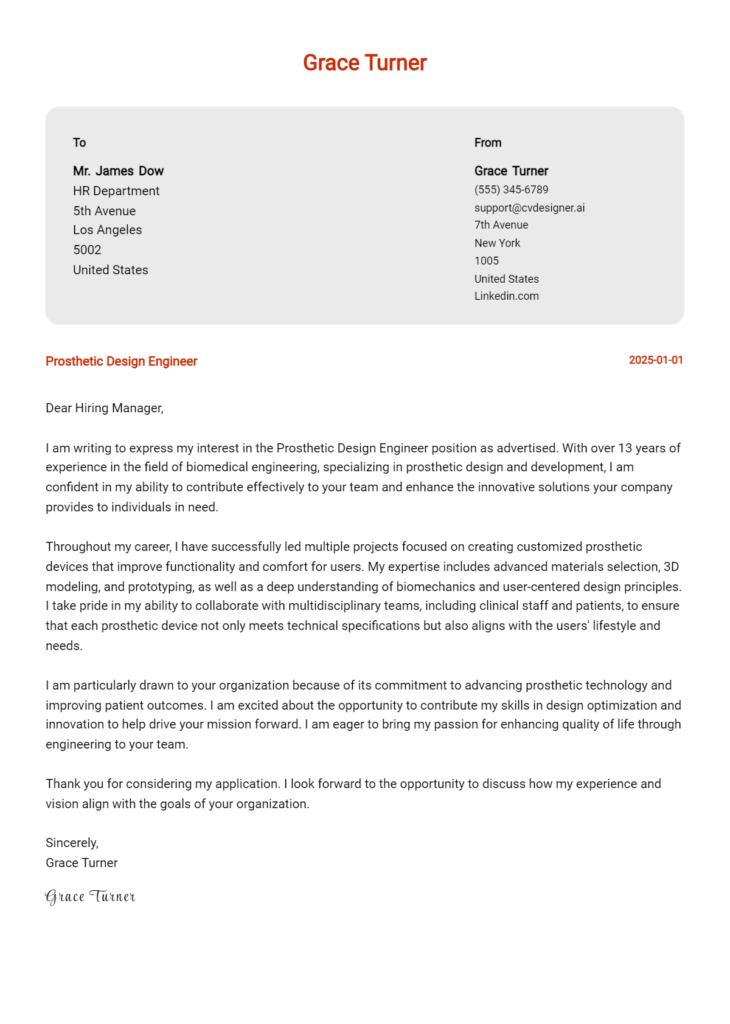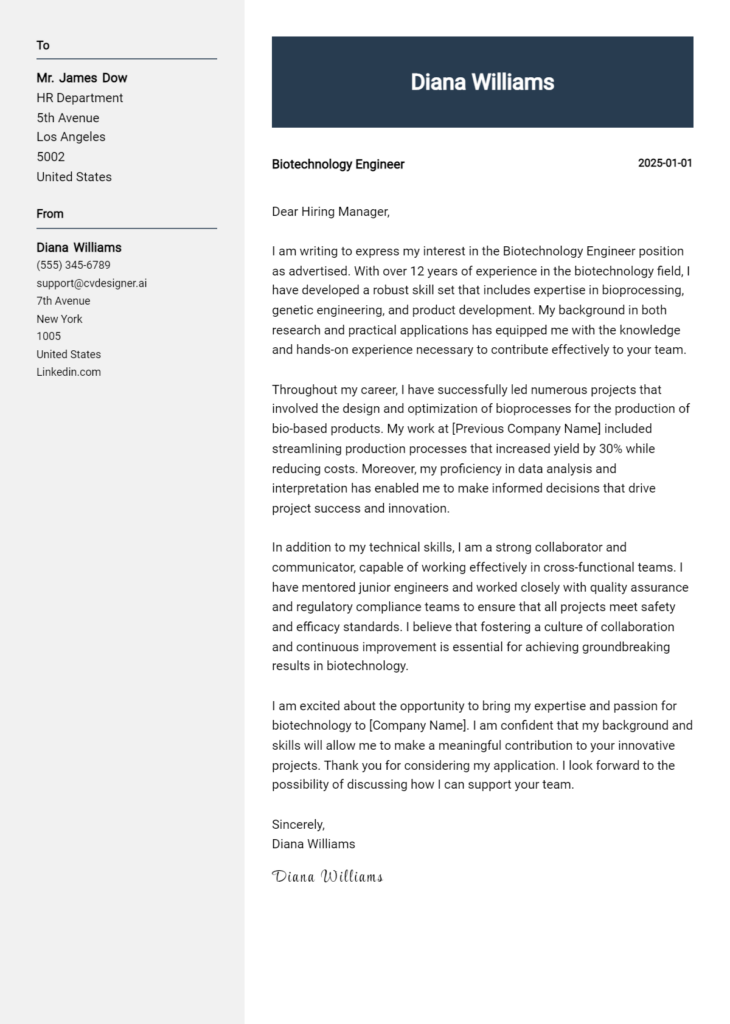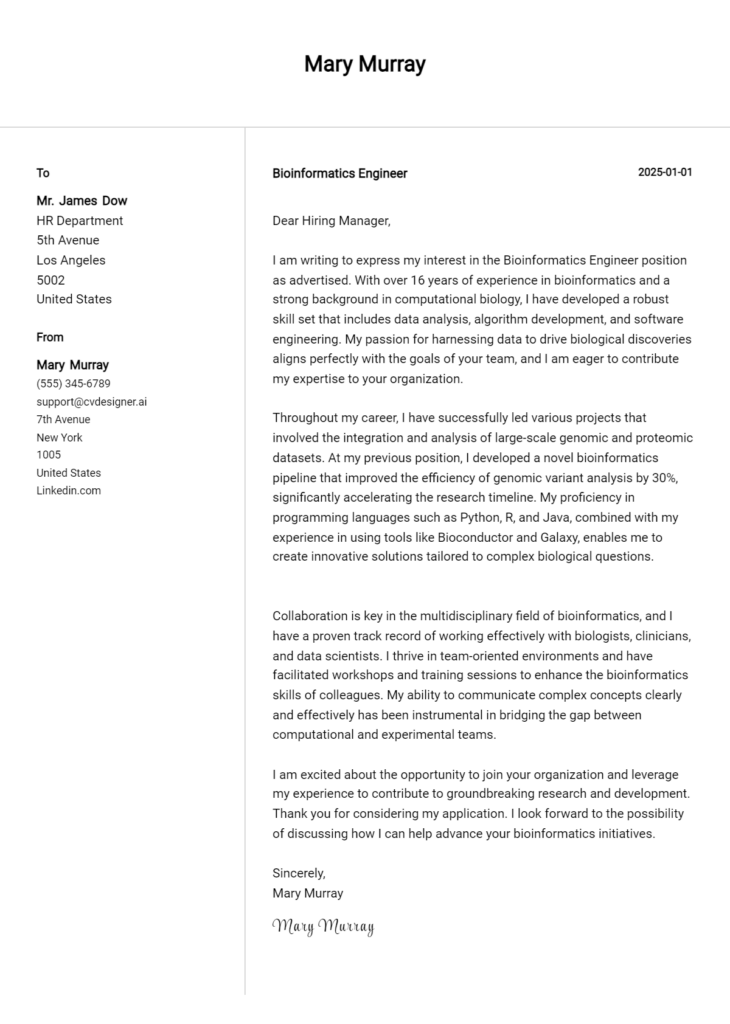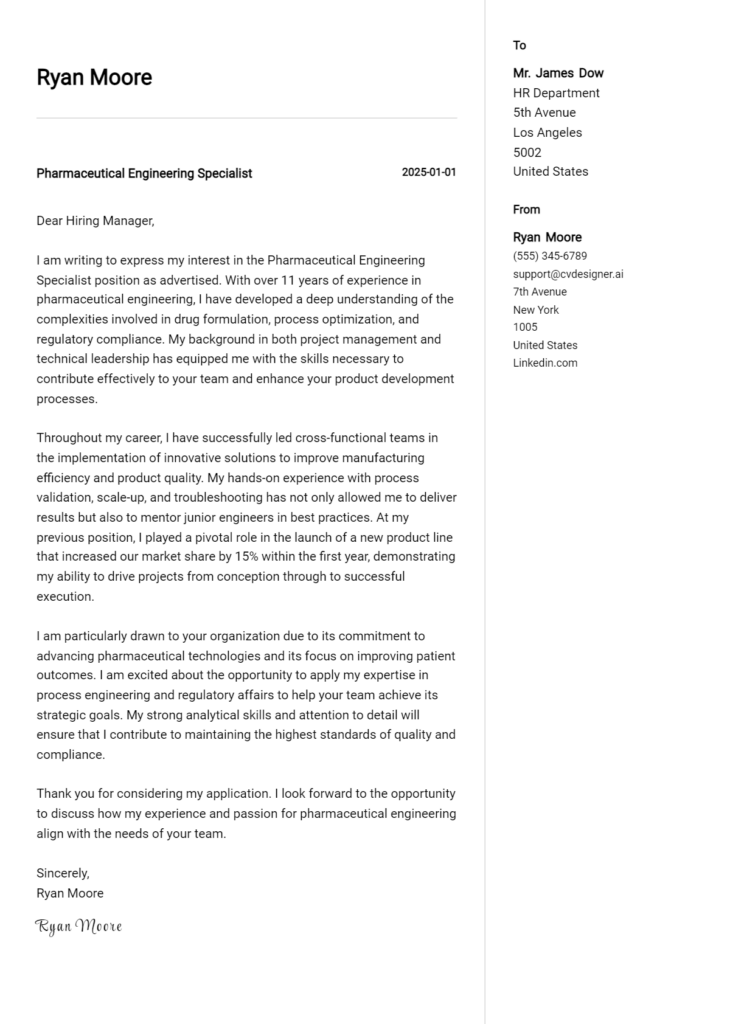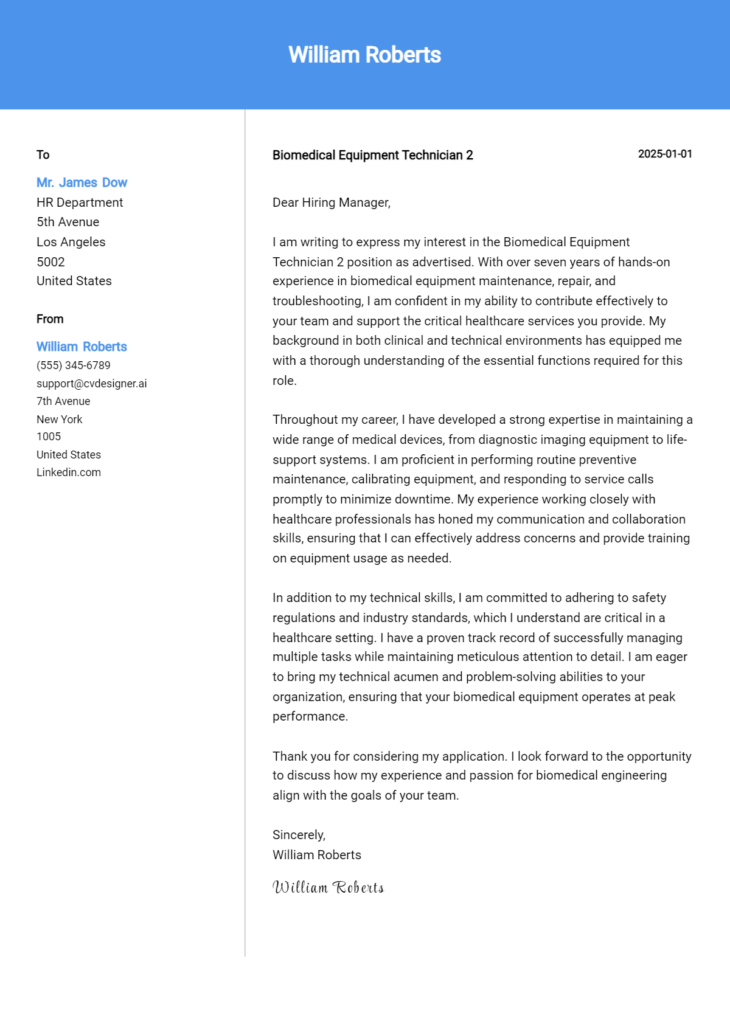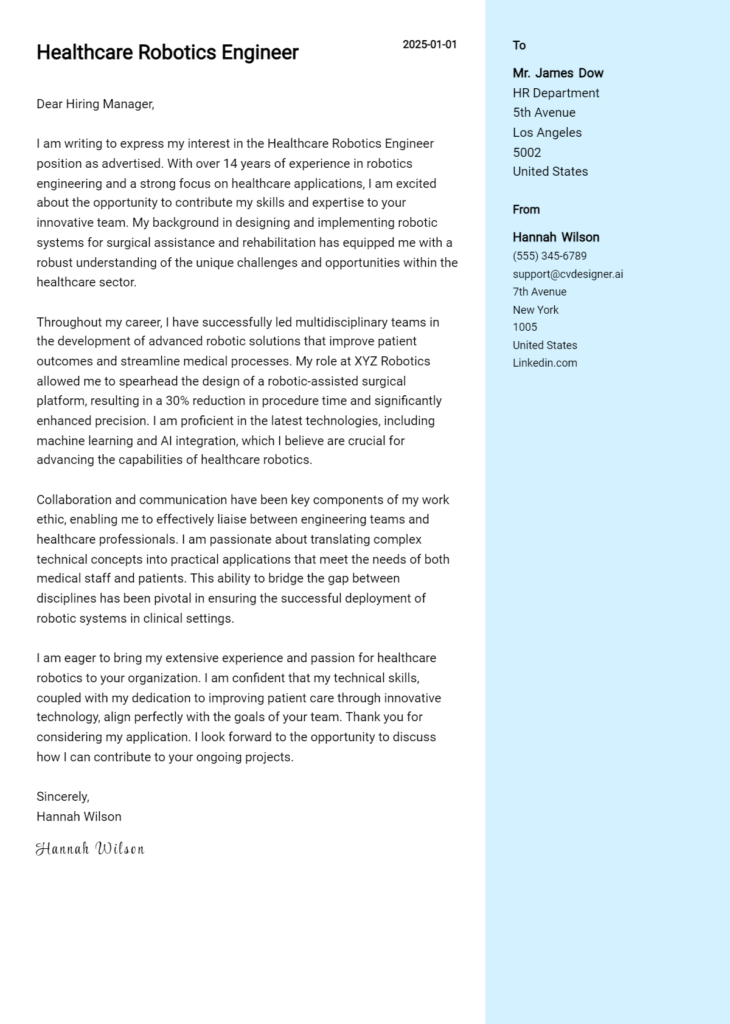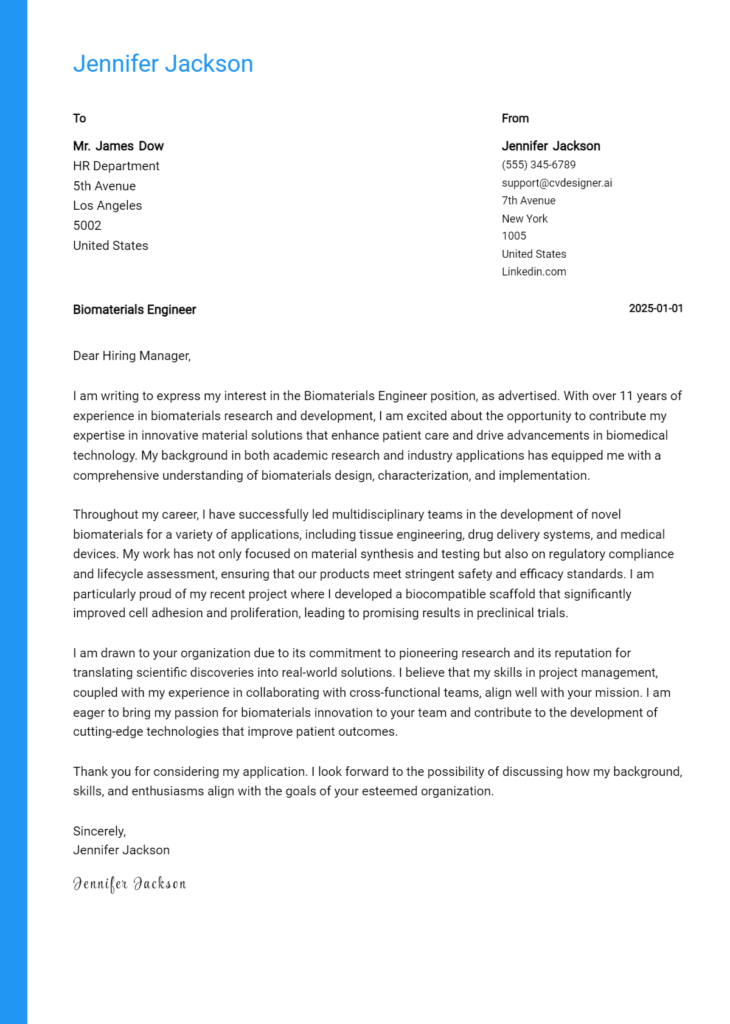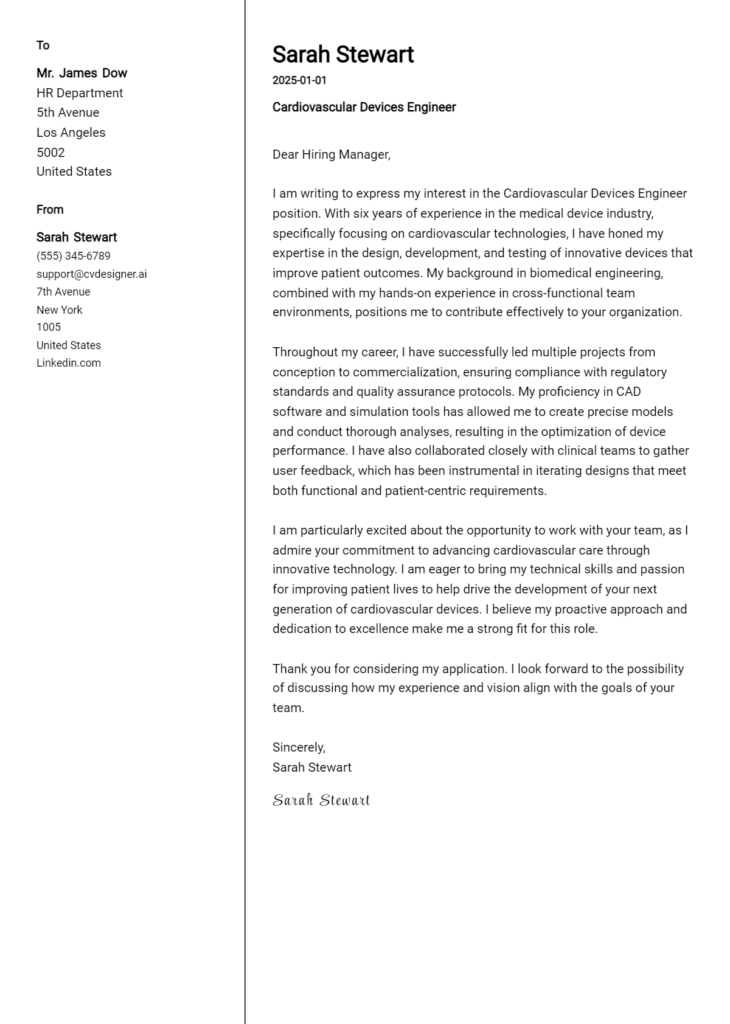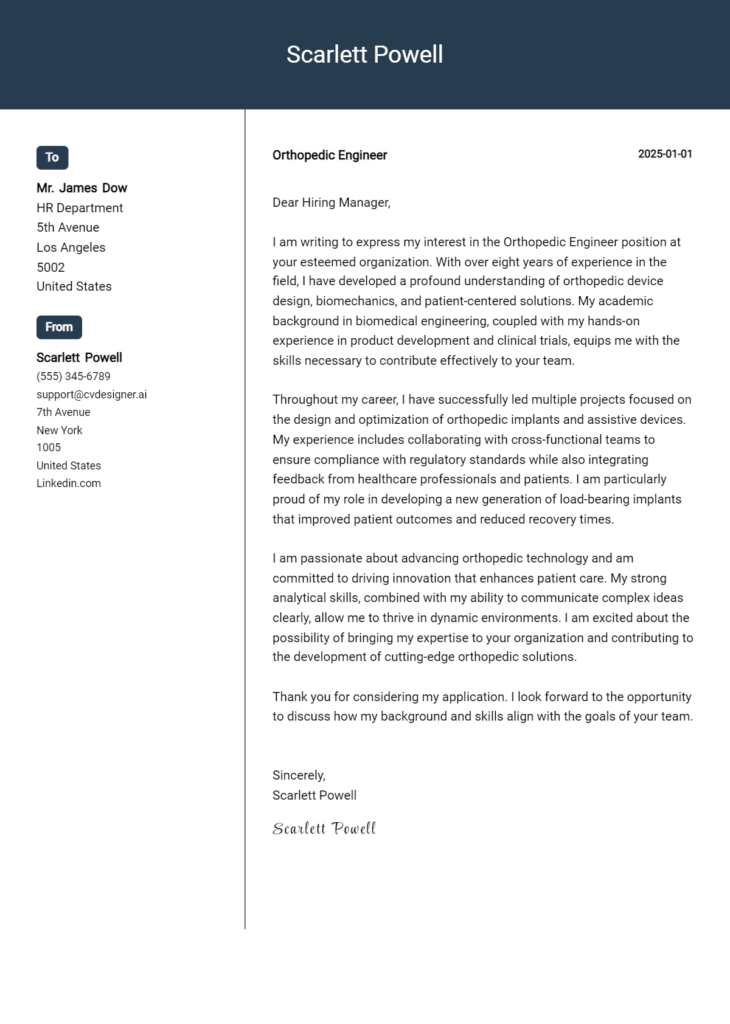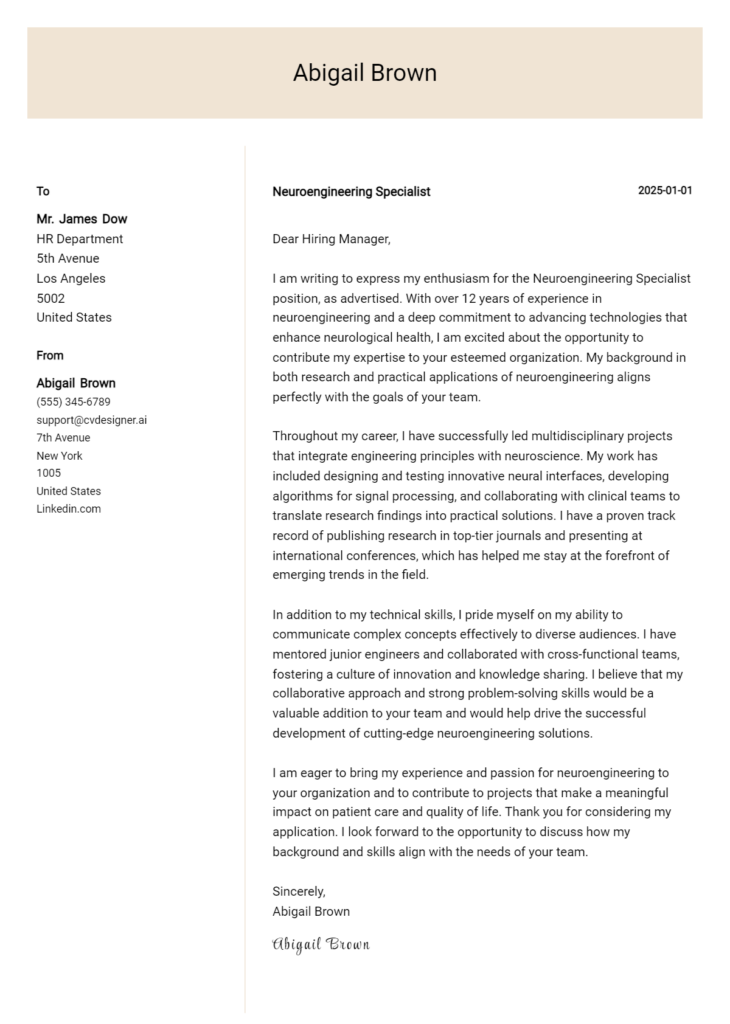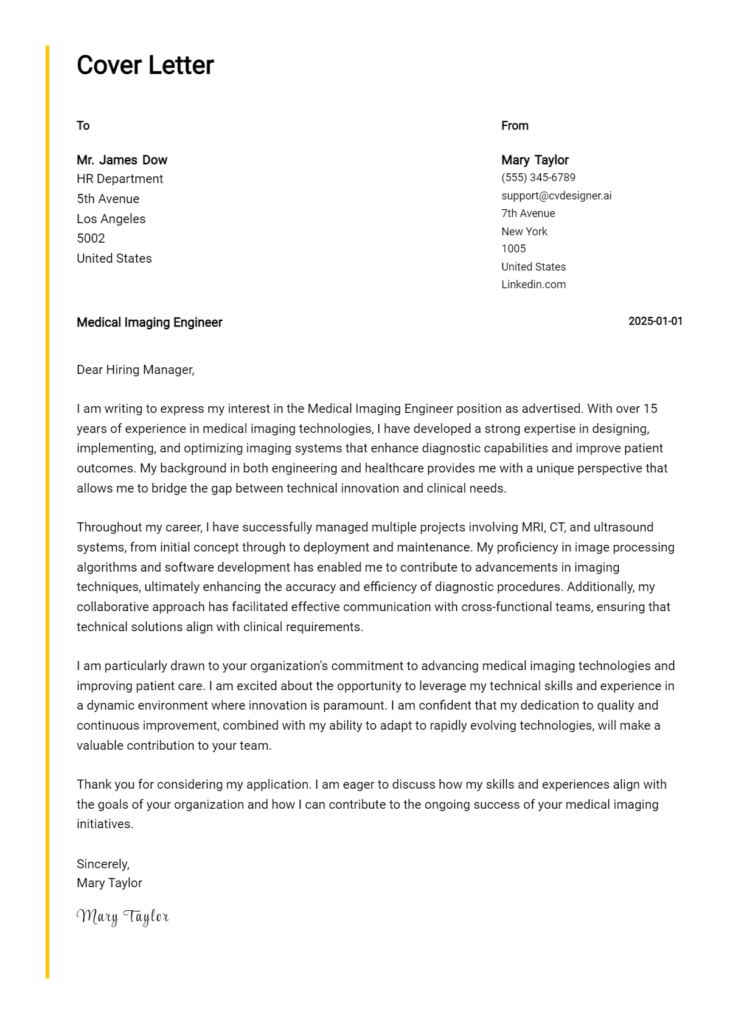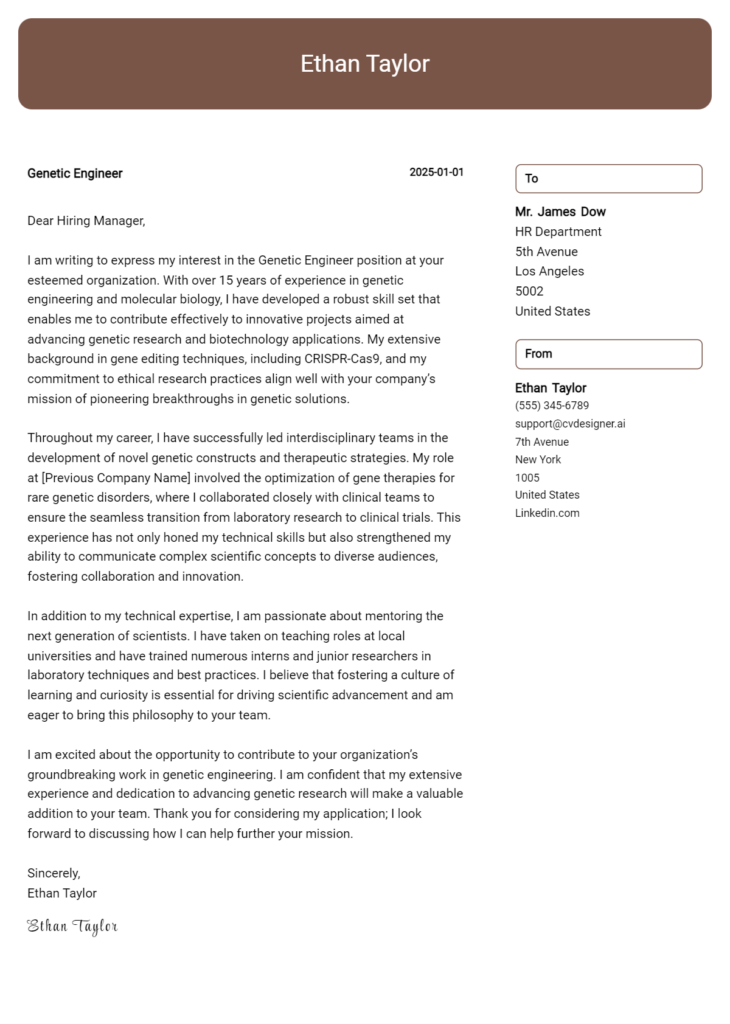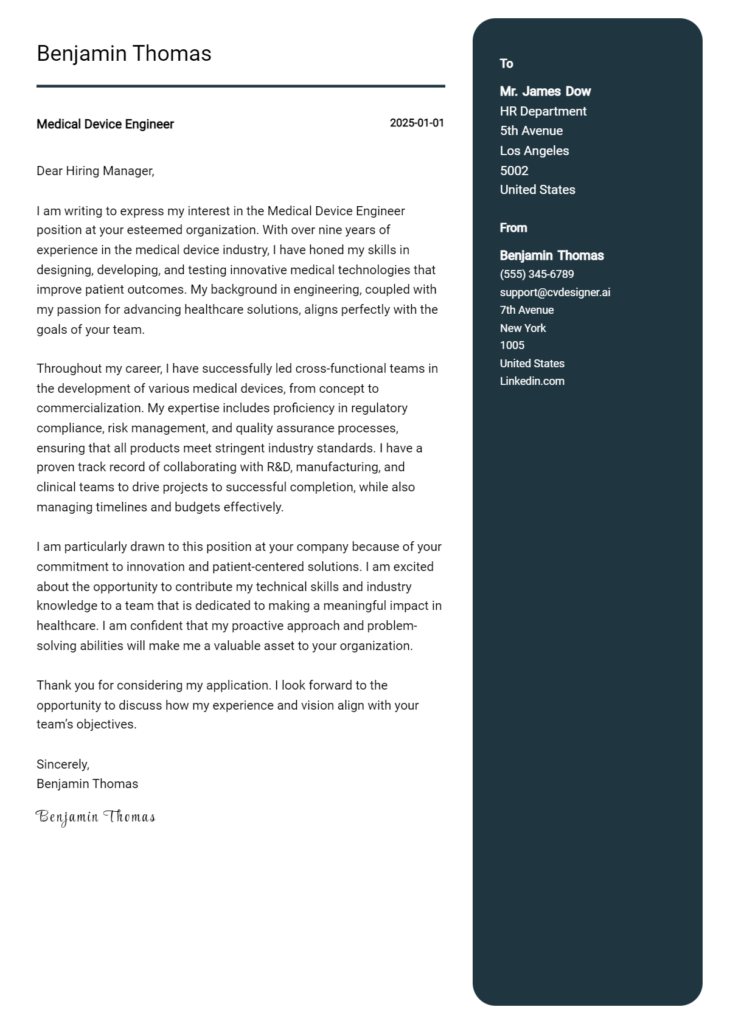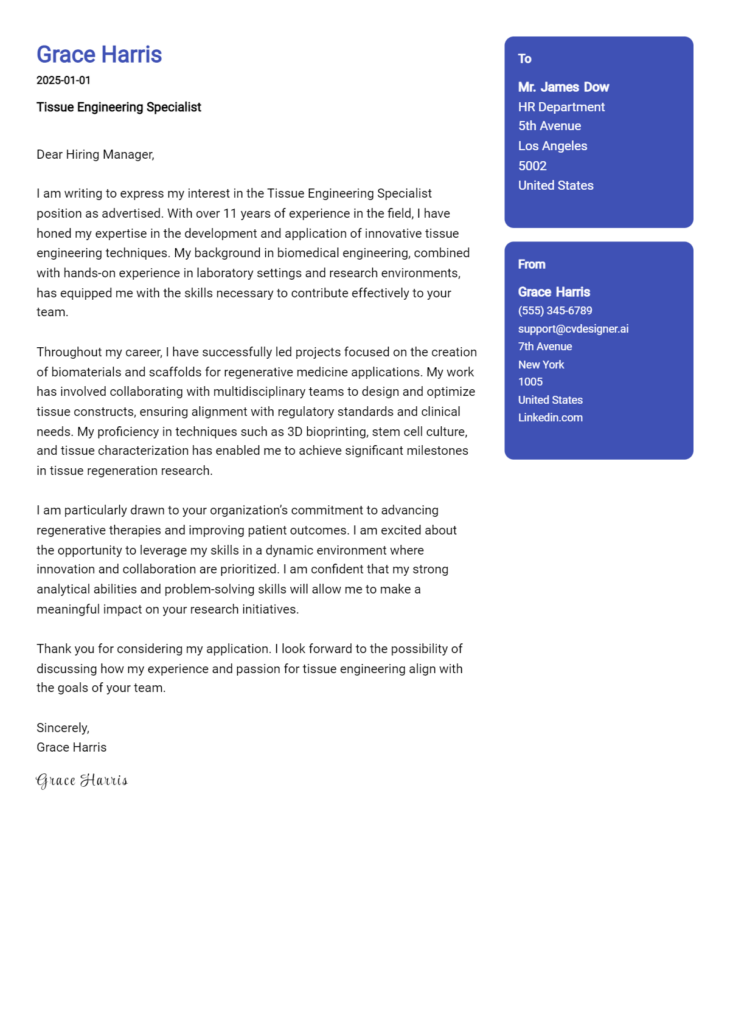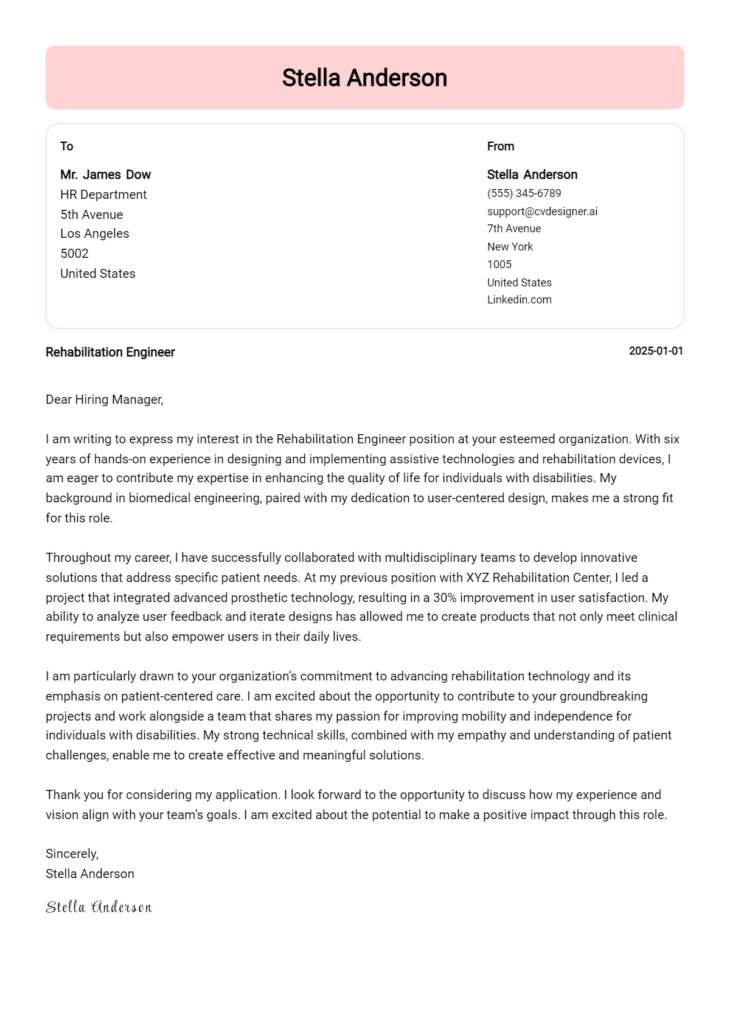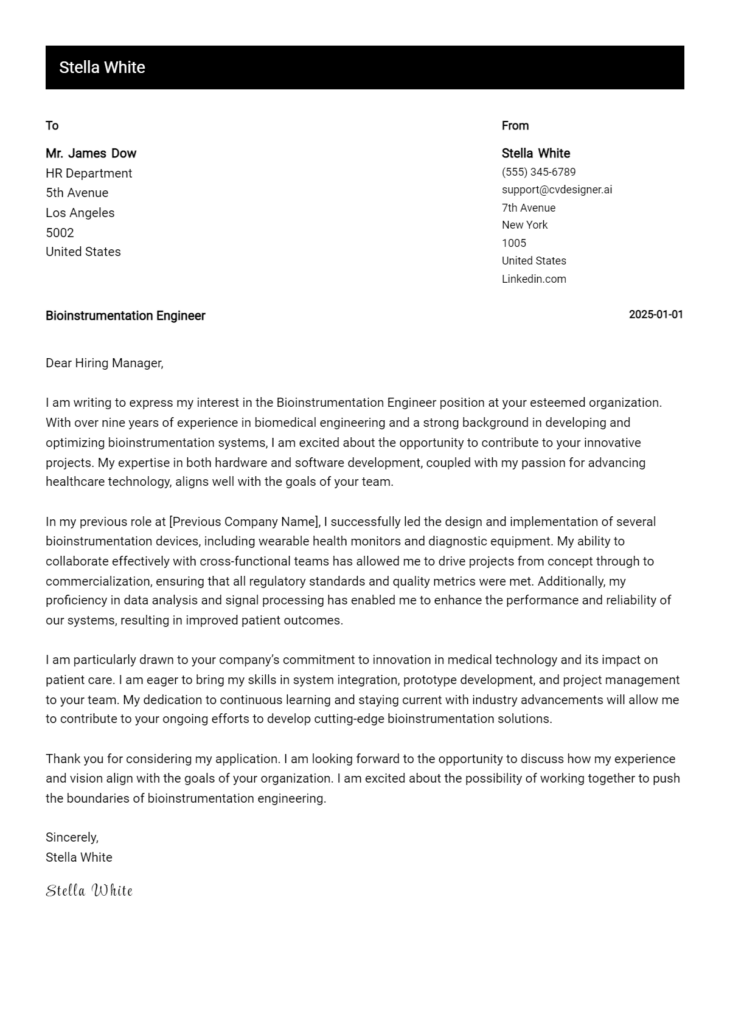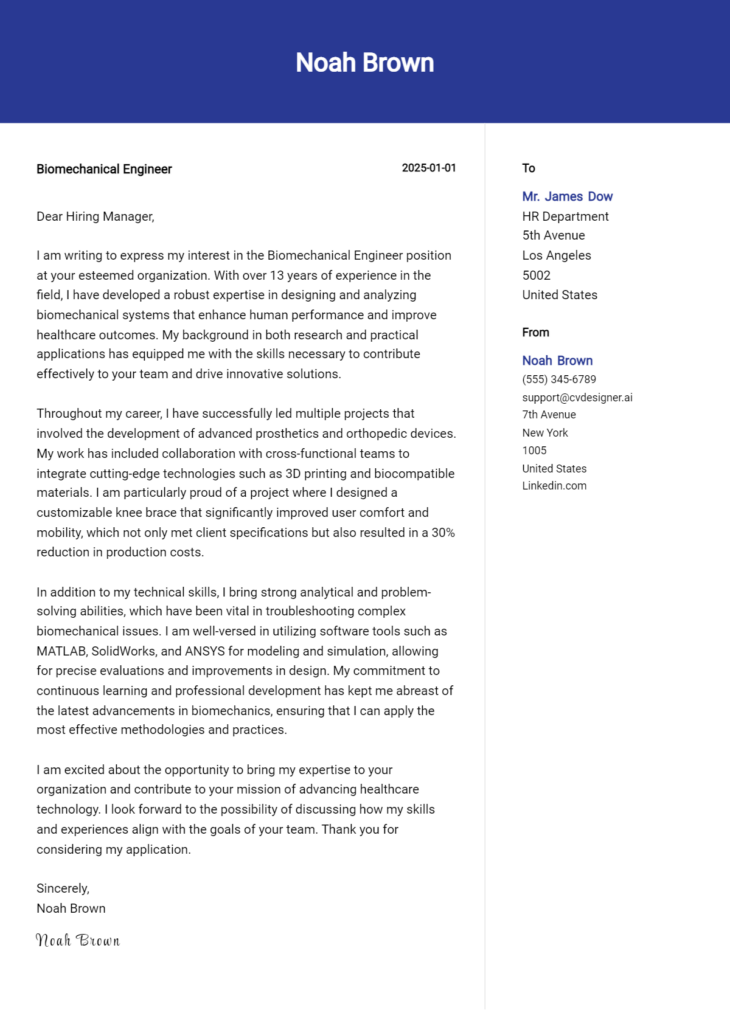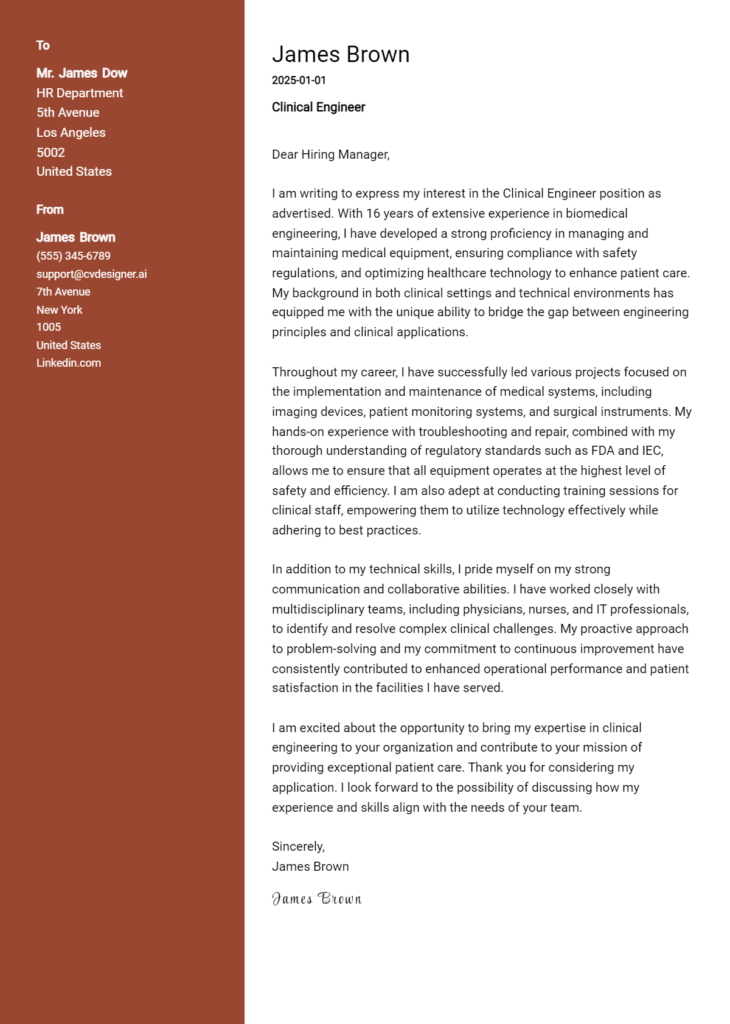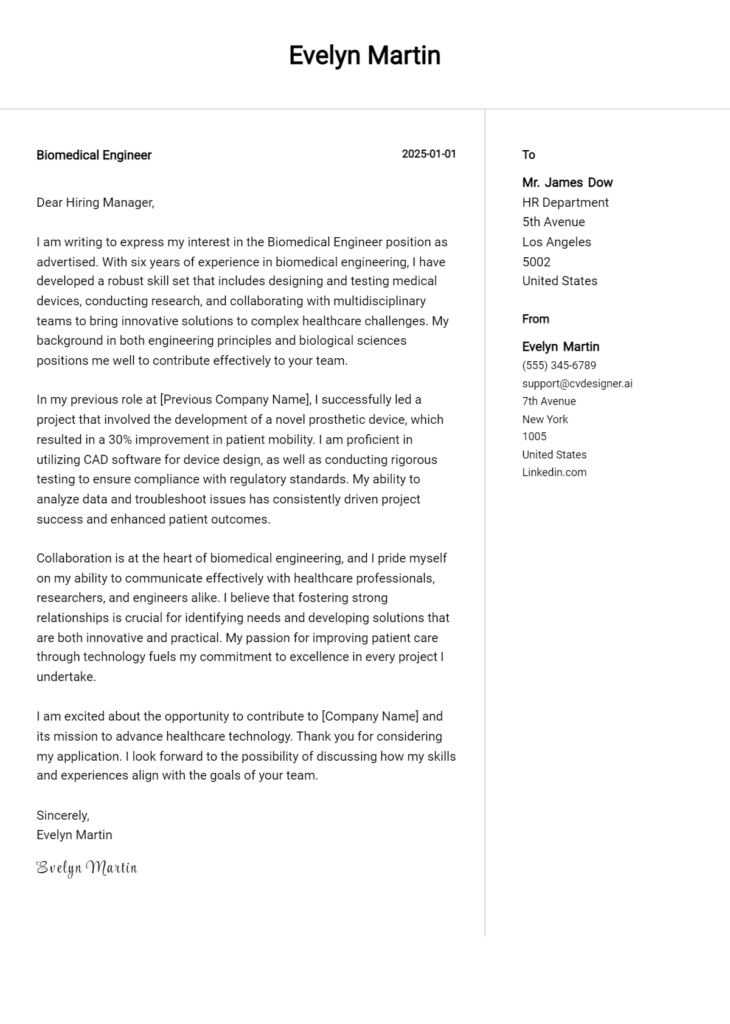Bioinstrumentation Engineer 2 Cover Letter Examples
Explore additional Bioinstrumentation Engineer 2 cover letter samples and guides and see what works for your level of experience or role.
How to Format a Bioinstrumentation Engineer Cover Letter?
Crafting an effective cover letter is essential for Bioinstrumentation Engineers, as it serves not only as a personal introduction but also as a reflection of your technical expertise and problem-solving abilities. The way you format your cover letter can significantly influence a hiring manager's perception of your professionalism and attention to detail—critical traits in the bioengineering field. A well-structured cover letter helps you stand out in a competitive job market by clearly presenting your qualifications and demonstrating your genuine interest in the role.
In this guide, we'll provide a comprehensive overview of how to structure your cover letter, along with specific examples tailored for Bioinstrumentation Engineers.
We'll focus on the key components of a professional cover letter, including:
- Cover Letter Header
- Cover Letter Greeting
- Cover Letter Introduction
- Cover Letter Body
- Cover Letter Closing
Each section is crucial in showcasing your skills and commitment to the field. Let's explore how to make your bioinstrumentation engineer cover letter truly exceptional.
Importance of the Cover Letter Header for a Bioinstrumentation Engineer
The header of a cover letter is crucial as it sets the tone for your application and provides essential information to the recipient. For a Bioinstrumentation Engineer, clarity and professionalism in the header not only reflect your attention to detail but also ensure that your application is easily identifiable and accessible. A well-structured header should include your contact information, the date, and the recipient's details, which together create a formal introduction to your cover letter. Below are examples of a strong and weak cover letter header for a Bioinstrumentation Engineer.
Strong Example
John Doe 123 Engineering Lane City, State, ZIP johndoe@email.com (555) 123-4567 October 10, 2023 Dr. Jane Smith Hiring Manager BioTech Innovations 456 Research Blvd City, State, ZIP
Weak Example
J.D. email@example.com 10/10/23 To whom it may concern,
The Importance of the Cover Letter Greeting for a Bioinstrumentation Engineer
The greeting of a cover letter is a pivotal element that sets the tone for the entire document. It serves as the first point of contact with the hiring manager and establishes a sense of professionalism and personalization. Addressing the hiring manager directly shows that you have taken the time to research the company and its employees, which reflects your genuine interest in the position. Avoiding generic greetings, such as "To Whom It May Concern," enhances your application by making it more tailored and engaging. If the name of the recipient is not readily available, taking the initiative to find it through the company's website or LinkedIn can significantly elevate the quality of your cover letter. Below are examples of strong and weak greetings for a Bioinstrumentation Engineer cover letter.
Strong Greeting Example
Dear Dr. Smith,
Weak Greeting Example
To Whom It May Concern,
Importance of a Captivating Cover Letter Introduction for a Bioinstrumentation Engineer
A well-crafted cover letter introduction is crucial for any job applicant, particularly for a specialized role like a Bioinstrumentation Engineer. This initial paragraph serves as the first impression, aiming to capture the hiring manager's attention and convey genuine interest in the position. It should succinctly highlight relevant skills or achievements that position the candidate as a strong fit for the role. A compelling introduction not only sets the tone for the rest of the cover letter but also invites the reader to learn more about the candidate's qualifications.
Strong Example
Dear [Hiring Manager's Name], I am excited to apply for the Bioinstrumentation Engineer position at [Company Name], as advertised on [Job Board]. With a Master’s degree in Biomedical Engineering and over five years of hands-on experience in developing innovative medical devices, I have successfully led projects that enhanced patient monitoring systems by integrating advanced bio-sensing technologies. My passion for improving healthcare outcomes through engineering solutions aligns perfectly with [Company Name]'s mission to transform medical practices.
Weak Example
Hello, I am applying for the Bioinstrumentation Engineer position. I have some experience in engineering and think I would be a good fit. I worked on a few projects in college and learned about bioinstrumentation, which seems interesting.
Purpose of the Cover Letter Body for a Bioinstrumentation Engineer
The cover letter body for a Bioinstrumentation Engineer serves to effectively communicate the candidate's unique skills, relevant experiences, and the value they can bring to the organization. This section allows the applicant to showcase specific projects or accomplishments that demonstrate their expertise in designing and developing bioinstrumentation systems, as well as their ability to work collaboratively in interdisciplinary teams. By highlighting metrics, innovations, and problem-solving capabilities, the candidate can create a compelling narrative that aligns with the company's goals and mission, ultimately making a strong case for their candidacy.
Strong Example
I am excited to apply for the Bioinstrumentation Engineer position at XYZ Corp. In my previous role at ABC Biomedical, I led a project that developed a novel biosensor for real-time glucose monitoring. This project not only improved patient outcomes by 30% but also resulted in a patent application that has the potential to enhance diabetes management. My expertise in signal processing and experience with FDA regulations enabled me to collaborate effectively with cross-functional teams, ensuring compliance and successful product launch. I am confident that my technical skills and passion for innovation will bring significant value to your research initiatives.
Weak Example
I am interested in the Bioinstrumentation Engineer position at XYZ Corp. I have worked on some engineering projects in the past. I believe my skills are good, and I can help your company. I once participated in a group project, but I didn’t lead it. I think I would be a good fit because I like working with technology and helping people.
Importance of the Cover Letter Closing for a Bioinstrumentation Engineer
The closing paragraph of a cover letter is a critical component that can leave a lasting impression on hiring managers. For a Bioinstrumentation Engineer, it should succinctly summarize key qualifications, express enthusiasm for the position, and encourage the reader to take the next steps, such as reviewing the attached resume or scheduling an interview. A well-crafted closing can reinforce your fit for the role and motivate the employer to engage further, while a weak closing may fail to highlight your strengths or convey your genuine interest in the opportunity.
Strong Example
Thank you for considering my application for the Bioinstrumentation Engineer position at [Company Name]. With my extensive experience in developing cutting-edge medical devices combined with my passion for improving patient outcomes, I am excited about the opportunity to contribute to your team. I look forward to the possibility of discussing how my skills in bioinstrumentation and my commitment to innovation can be an asset to your organization. Please feel free to review my attached resume and contact me to schedule a convenient time for an interview.
Weak Example
Thanks for reading my letter. I hope you think I’m a good fit for the job. I guess you can look at my resume if you want. Let me know if you want to talk.
Crafting an effective cover letter is crucial for aspiring Bioinstrumentation Engineers, as it serves as a vital tool to differentiate yourself in a competitive job market. Your cover letter should not only highlight your technical skills and problem-solving abilities but also demonstrate your understanding of the Software Development Life Cycle (SDLC), your capacity for teamwork, and your dedication to continuous learning. The following tips will guide you in showcasing these essential qualities, making your application stand out to potential employers.
Tips for Writing an Effective Cover Letter for Bioinstrumentation Engineer
Highlight Technical Skills
Bioinstrumentation requires a unique blend of engineering and biological knowledge. Clearly outline your technical skills related to instrumentation design, signal processing, and data analysis. Use specific examples from your experience that demonstrate your proficiency with relevant tools and technologies. Tailoring your technical skills to match the job description can greatly enhance your appeal.Demonstrate Problem-Solving Abilities
Engineers are often tasked with solving complex issues. Share a brief narrative that illustrates your problem-solving approach. Discuss a challenging project you worked on, the obstacles you faced, and the innovative solutions you implemented. This not only showcases your analytical skills but also highlights your ability to think critically under pressure.Showcase SDLC Knowledge
Familiarity with the Software Development Life Cycle is essential for Bioinstrumentation Engineers, particularly in roles that involve software integration with medical devices. Briefly explain your understanding of the SDLC phases and provide examples of how you have successfully applied this knowledge in past projects. This demonstrates your capability to contribute effectively to software-related tasks.Emphasize Teamwork and Collaboration
The ability to work well in a team is vital in the field of bioinstrumentation. Share experiences where you collaborated with multidisciplinary teams. Highlight your role in those projects and how your contributions led to successful outcomes. Employers appreciate candidates who can foster a collaborative environment and communicate effectively with colleagues.Express a Passion for Continuous Learning
The field of bioinstrumentation is constantly evolving, making it essential for engineers to stay updated on the latest advancements. Convey your enthusiasm for ongoing education—whether through formal courses, certifications, or self-study. Mention any relevant workshops or conferences you have attended, and discuss how these experiences have enhanced your skill set.
By integrating these tips into your cover letter, you can effectively showcase your qualifications as a Bioinstrumentation Engineer. To further assist you in crafting your application, consider utilizing cover letter templates or a cover letter builder to create a professional and polished look. Good luck with your application!
Common Mistakes to Avoid in a Bioinstrumentation Engineer Cover Letter
Crafting a compelling cover letter is essential for standing out in the competitive field of bioinstrumentation engineering. Avoiding common mistakes can significantly enhance your chances of making a positive impression on potential employers. Here are some frequent pitfalls to watch out for:
- Generic Greetings: Using "To Whom It May Concern" can make your letter feel impersonal. Instead, try to find the hiring manager's name to personalize your greeting.
- Lack of Specificity: Failing to mention the specific position or company can give the impression that you are sending out a generic application. Always tailor your letter to the job you’re applying for.
- Overly Technical Language: While it's important to showcase your expertise, using too much jargon can alienate readers. Aim for clarity and ensure that your passion for bioinstrumentation comes through without overwhelming technical detail.
- Neglecting Accomplishments: Merely listing job duties instead of highlighting achievements can minimize your impact. Focus on specific examples that demonstrate your skills and contributions, such as successful projects or innovative solutions.
- Ignoring Formatting Guidelines: Not following proper cover letter format can make your letter visually unappealing. Use a clean, professional layout that is easy to read.
- Typos and Grammatical Errors: Submitting a letter with mistakes can signal a lack of attention to detail. Always proofread your letter or ask a colleague to review it before sending it out.
- Failing to Include a Call to Action: Not ending your letter with a strong closing statement can leave it feeling incomplete. Encourage the reader to contact you for further discussion about your qualifications.
By being mindful of these common mistakes and following best practices, you can create a standout cover letter that effectively showcases your qualifications as a bioinstrumentation engineer. For inspiration, check out these cover letter examples to help guide your writing process.
Cover Letter FAQs for Bioinstrumentation Engineer
What should I include in my cover letter as a Bioinstrumentation Engineer?
In your cover letter, emphasize your educational background and relevant experience in bioinstrumentation. Highlight specific projects you've worked on, particularly those that showcase your skills in designing, developing, and testing biomedical devices. Discuss your proficiency with relevant software and tools, such as MATLAB or LabVIEW. Include any certifications or training in areas like regulatory compliance, which are crucial in the biomedical field. Lastly, articulate your passion for advancing healthcare technology and how your contributions can align with the organization’s mission.
How can I tailor my cover letter for a specific job application?
To tailor your cover letter, start by thoroughly analyzing the job description and identifying key skills and experiences the employer seeks. Use these insights to align your qualifications with the company’s needs. Mention the company by name and express your enthusiasm for their specific projects or values, demonstrating that you've done your research. Incorporate relevant keywords from the job posting to create a connection between your skills and the position. Personalizing your cover letter in this way can significantly enhance your chances of standing out to recruiters.
How do I demonstrate my technical skills in my cover letter?
To effectively demonstrate your technical skills in your cover letter, provide specific examples of your past work that highlight those skills. For instance, describe a project where you utilized your expertise in biomedical signal processing or instrumentation design. Include quantitative outcomes, such as improvements in device efficiency or accuracy, to showcase your impact. Additionally, mention software tools or methodologies you are proficient in, and how you applied them to solve complex engineering problems. This not only illustrates your technical abilities but also your practical application of those skills in real-world scenarios.
Should I include my research experience in my cover letter?
Yes, including your research experience in your cover letter is beneficial, especially in the field of bioinstrumentation. Research showcases your ability to engage in critical thinking, problem-solving, and innovative design—qualities that are highly valued in engineering roles. Detail specific research projects that relate to bioinstrumentation, highlighting your role, methodologies used, and any significant findings or contributions. If you published papers or presented at conferences, mention those achievements to further emphasize your expertise. This not only enriches your narrative but also positions you as a knowledgeable candidate in the field.
Build your Cover Letter in minutes
Use an AI-powered cover letter builder and have your letter done in 5 minutes. Just select your template and our software will guide you through the process.

